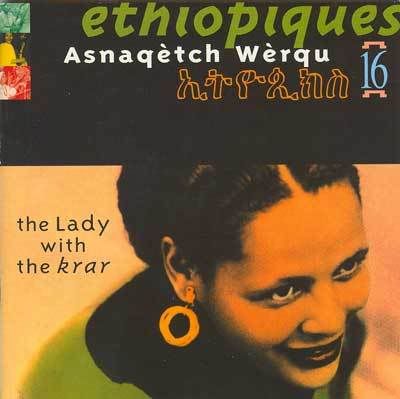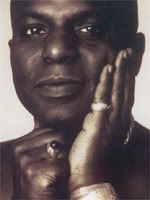 Asnaqetch Werqu was born an orphan who went on to become the first actress to appear on the Ethiopian stage. However, her musical talent garnered her attention that outshone her acting career in the National Theatre. Reportedly, she initially worked as an actress and dancer in the Haile Sellassie I theatre troupe and was actually the first woman to be part of this troupe. At an early age Asnaqetch taught herself to play the krar and eventually went on to become famous as a master of the krar (lyre) and a singer who was considered to be the last great storyteller to engage in the tradition of poetic jousting, following in the traditions of the Azmaris or artist caste.
Asnaqetch Werqu was born an orphan who went on to become the first actress to appear on the Ethiopian stage. However, her musical talent garnered her attention that outshone her acting career in the National Theatre. Reportedly, she initially worked as an actress and dancer in the Haile Sellassie I theatre troupe and was actually the first woman to be part of this troupe. At an early age Asnaqetch taught herself to play the krar and eventually went on to become famous as a master of the krar (lyre) and a singer who was considered to be the last great storyteller to engage in the tradition of poetic jousting, following in the traditions of the Azmaris or artist caste.A five (sometimes six) stringed lyre with a gut resonator, the krar was an ancient Ethiopian instrument frequently used by the Azmari or musician class. It has been said the the Japanese koto has a sound similar to that the krar. Azmari, can be male or female, and are skilled at singing spontaneous verses while playing the krar or masenqo (one-stringed fiddle). They play in drinking establishments known as 'tejbeit' that serve 'tej' (honey mead). They are also often invited to perform at private parties where they would improvise lyrics based on a theme suggested by the host. This poetic jousting not only relies improvisation but the art of poignant verses, wit, imagery and sarcastic puns.
Following Haile Selaissie's removal from office by the Derg in 1974, artists in Ethiopia were often forced underground to perform or had to attempt to create their music in a very hostile environment. This repressive regime slaughtered hundreds of thousands and fuelled subsequent unrest. Nevertheless a brief period of artistic freedom existed in the 70's between Selaissie's imperial rule and the military junta of the Derg.
The French label Buda Musique, was able to select 22 songs to compile an album for Volume 16 of the acclaimed Ethiopiques series - named The Lady With The Krar. These songs were chosen from two LPs recorded in 1974 and 1976. Buda Musique acquired them from their previously-acquired Kaifa Records archive (1973-77). Apparently, the first 12 songs on this album were released during the beginning of the revolutionary disorder and were banned almost immediately afterwards, as many records were simply taken off of store shelves. It didn't help that the krar was often regarded as a 'devil's instrument' by certain segments of the population.
Werqu's verses evoke epic tales and her love ballads are tinged with longing and melancholy. Surprisingly, during her time as an musician and actress, artists in general were frowned upon, and this was especially true for female ones. This contributed to many hardships and suffering in Werqu's life, which she often expressed in her music, as she recorded her struggles against the conventions of established society. Ironically enough, it is from the depths of this emotional angst that we see the emergence of a profound spiritual beauty that resonates with her
'serenely-emotional' vocals as they meld with the hypnotic melodies of the krar.
Tune in to Kemet Music Radio to listen to Asnaqetch Werqu and many other original African artists
Selected Discography:
Album: Ethiopiques 16: Asnaqetch Werqu : The Lady With the Krar
Label: Buda Musique
Year: 2004

 As a musical director, Mahmoud Fadl contributed to a four album project called "Salamat", released on Piranha records, which focussed on the music of the legendary and suppressed Nubian culture. He has four albums released under his own name and on one of them pays a Nubian homage to deceased pan-Arabian diva Umm Kalthoum, showcasing the voice of Salwa Abou Greisha from the famous Greisha family of Nubian musicians, with accompaniment from the Cairo Opera. Mahmoud's album "Drummers of the Nile", features ancient music from along the nile, and he collaborates with fellow drummers Gaafar Hargal and Hamdi Matoul, Nubian wedding diva Salma and many more musicians. He has also collaborated with The Klezmatics (New York), Orientalist piano player Maurice El Medioni (Marseille/Oran) and the famous gypsy saxophone player Ferus Mustafov (Skopje). Mahmoud also introduced western audiences to the distinguished grandmaster of oriental trumpet, Samy El Bably, on an alluring album called "Love Letters from King Tut-Ank Amen."
As a musical director, Mahmoud Fadl contributed to a four album project called "Salamat", released on Piranha records, which focussed on the music of the legendary and suppressed Nubian culture. He has four albums released under his own name and on one of them pays a Nubian homage to deceased pan-Arabian diva Umm Kalthoum, showcasing the voice of Salwa Abou Greisha from the famous Greisha family of Nubian musicians, with accompaniment from the Cairo Opera. Mahmoud's album "Drummers of the Nile", features ancient music from along the nile, and he collaborates with fellow drummers Gaafar Hargal and Hamdi Matoul, Nubian wedding diva Salma and many more musicians. He has also collaborated with The Klezmatics (New York), Orientalist piano player Maurice El Medioni (Marseille/Oran) and the famous gypsy saxophone player Ferus Mustafov (Skopje). Mahmoud also introduced western audiences to the distinguished grandmaster of oriental trumpet, Samy El Bably, on an alluring album called "Love Letters from King Tut-Ank Amen."